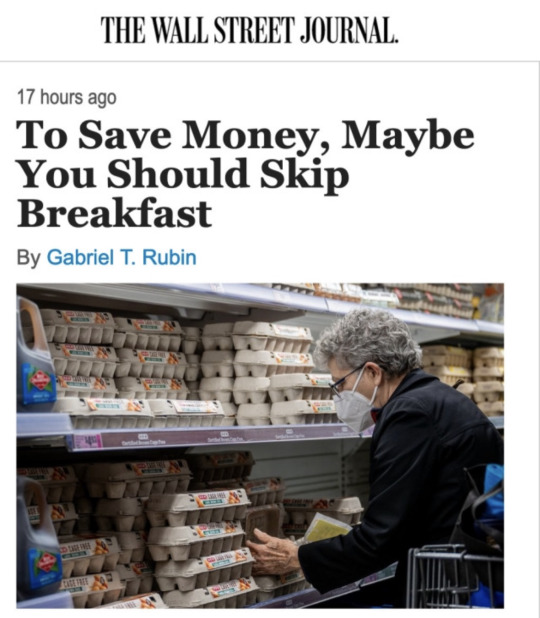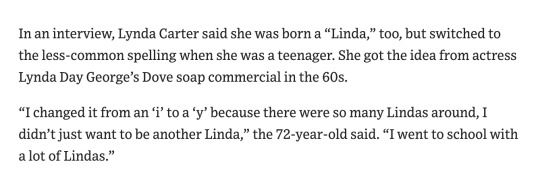#wall street journal
Text
Why they're smearing Lina Khan

My god, they sure hate Lina Khan. This once-in-a-generation, groundbreaking, brilliant legal scholar and fighter for the public interest, the slayer of Reaganomics, has attracted more vitriol, mockery, and dismissal than any of her predecessors in living memory.
She sure must be doing something right, huh?
A quick refresher. In 2017, Khan — then a law student — published Amazon’s Antitrust Paradox in the Yale Law Journal. It was a brilliant, blistering analysis showing how the Reagan-era theory of antitrust (which celebrates monopolies as “efficient”) had failed on its own terms, using Amazon as Exhibit A of the ways in which post-Reagan antitrust had left Americans vulnerable to corporate abuse:
https://www.yalelawjournal.org/note/amazons-antitrust-paradox
The paper sent seismic shocks through both legal and economic circles, and goosed the neo-Brandeisian movement (sneeringly dismissed as “hipster antitrust”). This movement is a rebuke to Reaganomics, with its celebration of monopolies, trickle-down, offshoring, corporate dark money, revolving-door regulatory capture, and companies that are simultaneously too big to fail and too big to jail.
This movement has many proponents, of course — not just Khan — but Khan’s careful scholarship, combined with her encyclopedic knowledge of the long-dormant statutory powers that federal agencies had to make change, and a strategy for reviving those powers to protect Americans from corporate predators made her a powerful, inspirational figure.
When Joe Biden won the 2020 presidential election, he surprised everyone by appointing Khan to the FTC. It wasn’t just that she had such a radical vision — it was also that she lacked the usual corporate law experience that such an appointee would normally require (experience that would ensure that the FTC was helmed by people whose default view of the world is that it should be structured and regulated by powerful, wealthy people in corporate boardrooms).
Even more surprising was that Khan was made chair of the FTC, something that was only possible because a few Republican Senators broke with their party to support her candidacy:
https://www.senate.gov/legislative/LIS/roll_call_votes/vote1171/vote_117_1_00233.htm
These Republicans saw in Khan an ally in their fight against “woke” Big Tech. For these senators, the problem wasn’t that tech had got too big and powerful — it was that there were a few limited instances in which tech leaders failed to wield that power in the ways they preferred.
The Republican project is a matter of getting turkeys to vote for Christmas by doing a lot of culture war bullshit, cruelly abusing disfavored sexual and racial minorities. This wins support from low-information voters who’ll vote against their class interests and support more monopolies, more tax cuts for the rich, and more cuts to the services they rely on.
But while tech leaders are 100% committed to the project of permanent oligarchic takeover of every sphere of American life, they are less full-throated in their support for hateful, cruel discrimination against disfavored minorities (in this regard, tech leaders resemble the corporate wing of the Democrats, which is where we get the “Silicon Valley is a Democratic Party stronghold” narrative).
This failure to unquestioningly and unstintingly back culture war bullshit put tech leaders in the GOP’s crosshairs. Some GOP politicians actually believe in the culture war bullshit, and are grossly offended that tech is “woke.” Others are smart enough not to get high on their own supply, but worry that any tech obstruction in the bullshit culture wars will make it harder to get sufficient turkey votes for a big fat Christmas surprise.
Biden’s ceding of antitrust policy to the left wing of the party, combined with disaffected GOP senators viewing Khan as their enemy’s enemy, led to Khan’s historic appointment as FTC Chair. In that position, she was joined by a slate of Biden trustbusters, including Jonathan Kanter at the DoJ Antitrust Division, Tim Wu at the White House, and other important, skilled and principled fighters like Alvaro Bedoya (FTC), Rebecca Slaughter (FTC), Rohit Chopra (CFPB), and many others.
Crucially, these new appointees weren’t just principled, they were good at their jobs. In 2021, Tim Wu wrote an executive order for Biden that laid out 72 concrete ways in which the administration could act — with no further Congressional authorization — to blunt corporate power and insulate the American people from oligarchs’ abusive and extractive practices:
https://pluralistic.net/2021/08/13/post-bork-era/#manne-down
Since then, the antitrust arm of the Biden administration have been fuckin’ ninjas, Getting Shit Done in ways large and small, working — for the first time since Reagan — to protect Americans from predatory businesses:
https://pluralistic.net/2022/10/18/administrative-competence/#i-know-stuff
This is in marked contrast to the corporate Dems’ champions in the administration. People like Pete Buttigieg are heralded as competent
technocrats, “realists” who are too principled to peddle hopium to the base, writing checks they can’t cash. All this is cover for a King Log performance, in which Buttigieg’s far-reaching regulatory authority sits unused on a shelf while a million Americans are stranded over Christmas and whole towns are endangered by greedy, reckless rail barons straight out of the Gilded Age:
https://pluralistic.net/2023/01/10/the-courage-to-govern/#whos-in-charge
The contrast between the Biden trustbusters and their counterparts from the corporate wing is stark. While the corporate wing insists that every pitch is outside of the zone, Khan and her allies are swinging for the stands. They’re trying to make life better for you and me, by declaring commercial surveillance to be an unfair business practice and thus illegal:
https://pluralistic.net/2022/08/12/regulatory-uncapture/#conscious-uncoupling
And by declaring noncompete “agreements” that shackle good workers to shitty jobs to be illegal:
https://pluralistic.net/2022/02/02/its-the-economy-stupid/#neofeudal
And naturally, this has really pissed off all the right people: America’s billionaires and their cheerleaders in the press, government, and the hive of scum and villainy that is the Big Law/thinktank industrial-complex.
Take the WSJ: since Khan took office, they have published 67 vicious editorials attacking her and her policies. Khan is living rent-free in Rupert Murdoch’s head. Not only that, he’s given her the presidential suite! You love to see it.
These attacks are worth reading, if only to see how flimsy and frivolous they are. One major subgenre is that Khan shouldn’t be bringing any action against Amazon, because her groundbreaking scholarship about the company means she has a conflict of interest. Holy moly is this a stupid thing to say. The idea that the chair of an expert agency should recuse herself because she is an expert is what the physicists call not even wrong.
But these attacks are even more laughable due to who they’re coming from: people who have the most outrageous conflicts of interest imaginable, and who were conspicuously silent for years as the FTC’s revolving door admitted the a bestiary of swamp-creatures so conflicted it’s a wonder they managed to dress themselves in the morning.
Writing in The American Prospect, David Dayen runs the numbers:
Since the late 1990s, 31 out of 41 top FTC officials worked directly for a company that has business before the agency, with 26 of them related to the technology industry.
https://prospect.org/economy/2023-06-23-attacks-lina-khans-ethics-reveal-projection/
Take Christine Wilson, a GOP-appointed FTC Commissioner who quit the agency in a huff because Khan wanted to do things for the American people, and not their self-appointed oligarchic princelings. Wilson wrote an angry break-up letter to Khan that the WSJ published, presaging their concierge service for Samuel Alito:
https://www.wsj.com/articles/why-im-resigning-from-the-ftc-commissioner-ftc-lina-khan-regulation-rule-violation-antitrust-339f115d
For Wilson to question Khan’s ethics took galactic-scale chutzpah. Wilson, after all, is a commissioner who took cash money from Bristol-Myers Squibb, then voted to approve their merger with Celgene:
https://www.documentcloud.org/documents/4365601-Wilson-Christine-Smith-final278.html
Or take Wilson’s GOP FTC predecessor Josh Wright, whose incestuous relationship with the companies he oversaw at the Commission are so intimate he’s practically got a Habsburg jaw. Wright went from Google to the US government and back again four times. He also lobbied the FTC on behalf of Qualcomm (a major donor to Wright’s employer, George Mason’s Antonin Scalia Law School) after working “personally and substantially” while serving at the FTC.
George Mason’s Scalia center practically owns the revolving door, counting fourteen FTC officials among its affliates:
https://campaignforaccountability.org/ttp-investigation-big-techs-backdoor-to-the-ftc/
Since the 1990s, 31 out of 41 top FTC officials — both GOP appointed and appointees backed by corporate Dems — “worked directly for a company that has business before the agency”:
https://www.citizen.org/article/ftc-big-tech-revolving-door-problem-report/
The majority of FTC and DoJ antitrust lawyers who served between 2014–21 left government service and went straight to work for a Big Law firm, serving the companies they’d regulated just a few months before:
https://therevolvingdoorproject.org/wp-content/uploads/2022/06/The-Revolving-Door-In-Federal-Antitrust-Enforcement.pdf
Take Deborah Feinstein, formerly the head of the FTC’s Bureau of Competition, now a partner at Arnold & Porter, where she’s represented General Electric, NBCUniversal, Unilever, and Pepsi and a whole medicine chest’s worth of pharma giants before her former subordinates at the FTC. Michael Moiseyev who was assistant manager of FTC Competition is now in charge of mergers at Weil Gotshal & Manges, working for Microsoft, Meta, and Eli Lilly.
There’s a whole bunch more, but Dayen reserves special notice for Andrew Smith, Trump’s FTC Consumer Protection boss. Before he was put on the public payroll, Smith represented 120 clients that had business before the Commission, including “nearly every major bank in America, drug industry lobbyist PhRMA, Uber, Equifax, Amazon, Facebook, Verizon, and a variety of payday lenders”:
https://www.citizen.org/sites/default/files/andrew_smith_foia_appeal_response_11_30.pdf
Before Khan, in other words, the FTC was a “conflict-of-interest assembly line, moving through corporate lawyers and industry hangers-on without resistance for decades.”
Khan is the first FTC head with no conflicts. This leaves her opponents in the sweaty, desperate position of inventing conflicts out of thin air.
For these corporate lickspittles, Khan’s “conflict” is that she has a point of view. Specifically, she thinks that the FTC should do its job.
This makes grifters like Jim Jordan furious. Yesterday, Jordan grilled Khan in a hearing where he accused her of violating an ethics official’s advice that she should recuse herself from Big Tech cases. This is a talking point that was created and promoted by Bloomberg:
https://www.bloomberg.com/news/articles/2023-06-16/ftc-rejected-ethics-advice-for-khan-recusal-on-meta-case
That ethics official, Lorielle Pankey, did not, in fact, make this recommendation. It’s simply untrue (she did say that Khan presiding over cases that she has made public statements about could be used as ammo against her, but did not say that it violated any ethical standard).
But there’s more to this story. Pankey herself has a gigantic conflict of interest in this case, including a stock portfolio with $15,001 and $50,000 in Meta stock (Meta is another company that has whined in print and in its briefs that it is a poor defenseless lamb being picked on by big, mean ole Lina Khan):
https://www.wsj.com/articles/ethics-official-owned-meta-stock-while-recommending-ftc-chair-recuse-herself-from-meta-case-8582a83b
Jordan called his hearing on the back of this fake scandal, and then proceeded to show his whole damned ass, even as his GOP colleagues got into a substantive and even informative dialog with Khan:
https://prospect.org/power/2023-07-14-jim-jordan-misfires-attacks-lina-khan/
Mostly what came out of that hearing was news about how Khan is doing her job, working on behalf of the American people. For example, she confirmed that she’s investigating OpenAI for nonconsensually harvesting a mountain of Americans’ personal information:
https://www.ft.com/content/8ce04d67-069b-4c9d-91bf-11649f5adc74
Other Republicans, including confirmed swamp creatures like Matt Gaetz, ended up agreeing with Khan that Amazon Ring is a privacy dumpster-fire. Nobodies like Rep TomM assie gave Khan an opening to discuss how her agency is protecting mom-and-pop grocers from giant, price-gouging, greedflation-drunk national chains. Jeff Van Drew gave her a chance to talk about the FTC’s war on robocalls. Lance Gooden let her talk about her fight against horse doping.
But Khan’s opponents did manage to repeat a lot of the smears against her, and not just the bogus conflict-of-interest story. They also accused her of being 0–4 in her actions to block mergers, ignoring the huge number of mergers that have been called off or not initiated because M&A professionals now understand they can no longer expect these mergers to be waved through. Indeed, just last night I spoke with a friend who owns a medium-sized tech company that Meta tried to buy out, only to withdraw from the deal because their lawyers told them it would get challenged at the FTC, with an uncertain outcome.
These talking points got picked up by people commenting on Judge Jacqueline Scott Corley’s ruling against the FTC in the Microsoft-Activision merger. The FTC was seeking an injunction against the merger, and Corley turned them down flat. The ruling was objectively very bad. Start with the fact that Corley’s son is a Microsoft employee who stands reap massive gains in his stock options if the merger goes through.
But beyond this (real, non-imaginary, not manufactured conflict of interest), Corley’s judgment and her remarks in court were inexcusably bad, as Matt Stoller writes:
https://www.thebignewsletter.com/p/judge-rules-for-microsoft-mergers
In her ruling, Corley explained that she didn’t think Microsoft would abuse the market dominance they’d gain by merging their giant videogame platform and studio with one of its largest competitors. Why not? Because Microsoft’s execs pinky-swore that they wouldn’t abuse that power.
Corely’s deference to Microsoft’s corporate priorities goes deeper than trusting its execs, though. In denying the FTC’s motion, she stated that it would be unfair to put the merger on hold in order to have a full investigation into its competition implications because Microsoft and Activision had set a deadline of July 18 to conclude things, and Microsoft would have to pay a penalty if that deadline passed.
This is surreal: a judge ruled that a corporation’s radical, massive merger shouldn’t be subject to full investigation because that corporation itself set an arbitrary deadline to conclude the deal before such an investigation could be concluded. That’s pretty convenient for future mega-mergers — just set a short deadline and Judge Corely will tell regulators that the merger can’t be investigated because the deadline is looming.
And this is all about the future. As Stoller writes, Microsoft isn’t exactly subtle about why it wants this merger. Its own execs said that the reason they were spending “dump trucks” of money buying games studios was to “spend Sony out of business.”
Now, maybe you hate Sony. Maybe you hate Activision. There’s plenty of good reason to hate both — they’re run by creeps who do shitty things to gamers and to their employees. But if you think that Microsoft will be better once it eliminates its competition, then you have the attention span of a goldfish on Adderall.
Microsoft made exactly the same promises it made on Activision when it bought out another games studio, Zenimax — and it broke every one of those promises.
Microsoft has a long, long, long history of being a brutal, abusive monopolist. It is a convicted monopolist. And its bad conduct didn’t end with the browser wars. You remember how the lockdown turned all our homes into rent-free branch offices for our employers? Microsoft seized on that moment to offer our bosses keystroke-and-click level surveillance of our use of our own computers in our own homes, via its Office365 bossware product:
https://pluralistic.net/2020/11/25/the-peoples-amazon/#clippys-revenge
If you think a company that gave your boss a tool to spy on their employees and rank them by “productivity” as a prelude to firing them or cutting their pay is going to treat gamers or game makers well once they have “spent the competition out of business,” you’re a credulous sucker and you are gonna be so disappointed.
The enshittification play is obvious: use investor cash to make things temporarily nice for customers and suppliers, lock both of them in — in this case, it’s with a subscription-based service similar to Netflix’s — and then claw all that value back until all that’s left is a big pile of shit.
The Microsoft case is about the future. Judge Corely doesn’t take the future seriously: as she said during the trial, “All of this is for a shooter videogame.” The reason Corely greenlit this merger isn’t because it won’t be harmful — it’s because she doesn’t think those harms matter.
But it does, and not just because games are an art form that generate billions of dollars, employ a vast workforce, and bring pleasure to millions. It also matters because this is yet another one of the Reaganomic precedents that tacitly endorses monopolies as efficient forces for good. As Stoller writes, Corley’s ruling means that “deal bankers are sharpening pencils and saying ‘Great, the government lost! We can get mergers through everywhere else.’ Basically, if you like your high medical prices, you should be cheering on Microsoft’s win today.”
Ronald Reagan’s antitrust has colonized our brains so thoroughly that commentators were surprised when, immediately after the ruling, the FTC filed an appeal. Don’t they know they’ve lost? the commentators said:
https://gizmodo.com/ftc-files-appeal-of-microsoft-activision-deal-ruling-1850640159
They echoed the smug words of insufferable Activision boss Mike Ybarra: “Your tax dollars at work.”
https://twitter.com/Qwik/status/1679277251337277440
But of course Khan is appealing. The only reason that’s surprising is that Khan is working for us, the American people, not the giant corporations the FTC is supposed to be defending us from. Sure, I get that this is a major change! But she needs our backing, not our cheap cynicism.
The business lobby and their pathetic Renfields have hoarded all the nice things and they don’t want us to have any. Khan and her trustbuster colleagues want the opposite. There is no measure so small that the corporate world won’t have a conniption over it. Take click to cancel, the FTC’s perfectly reasonable proposal that if you sign up for a recurring payment subscription with a single click, you should be able to cancel it with a single click.
The tooth-gnashing and garment-rending and scenery-chewing over this is wild. America’s biggest companies have wheeled out their biggest guns, claiming that if they make it too easy to unsubscribe, they will lose money. In other words, they are currently making money not because people want their products, but because it’s too hard to stop paying for them!
https://www.theregister.com/2023/07/12/ftc_cancel_subscriptions/
We shouldn’t have to tolerate this sleaze. And if we back Khan and her team, they’ll protect us from these scams. Don’t let them convince you to give up hope. This is the start of the fight, not the end. We’re trying to reverse 40 years’ worth of Reagonmics here. It won’t happen overnight. There will be setbacks. But keep your eyes on the prize — this is the most exciting moment for countering corporate power and giving it back to the people in my lifetime. We owe it to ourselves, our kids and our planet to fight one.

If you’d like an essay-formatted version of this post to read or share, here’s a link to it on pluralistic.net, my surveillance-free, ad-free, tracker-free blog:
https://pluralistic.net/2023/07/14/making-good-trouble/#the-peoples-champion

[Image ID: A line drawing of pilgrims ducking a witch tied to a ducking stool. The pilgrims' clothes have been emblazoned with the logos for the WSJ, Microsoft, Activision and Blizzard. The witch's face has been replaced with that of FTC chair Lina M Khan.]
#pluralistic#amazon's antitrust paradox#lina khan#business lobby#lina m khan#ftc#federal trade commission#david dayen#microsoft#activision#blizzard#wsj#wall street journal#reaganomics#trustbusting#antitrust#mergers#merger to monopoly#gaming#xbox#matt stoller#the american prospect#jim jordan#click to cancel#robert bork#Judge Jacqueline Scott Corley#microsoft activision#fuckin' ninjas
6K notes
·
View notes
Text

You know, this reminds me of something

Ah, yes.
#troglodyte thoughts#free range sustainable shitpost#eat the rich#poverty#economy#wages#politics#wall street journal#marie antoinette#wage disparity#class warfare
1K notes
·
View notes
Text

The IOF's started fuckin seawater into the tunnel system despite it potentially hurting the freshwater supply
Not that 98% of it was even drinkable anyway but still
#free gaza#free palestine#gaza strip#irish solidarity with palestine#palestine#gaza#news on gaza#al jazeera#boycott israel#israel#Wall Street Journal#iof terrorism#Hamas
278 notes
·
View notes
Text








Natalie Massenet and Erik Torstensson's manor house in Donhead St. Andrew. x
#god rly recommend checking the article the place is gorgeous#interiors#home decor#manor#english countryside#natalie massanet#net a porter#donhead st. andrew#wall street journal#home#upl#the hits
2K notes
·
View notes
Text
If you see the Wall Street Journal article on the new Vince stuff MASSIVE trigger warnings there's some real awful shit in there.

Actually here's the link to the non paywalled ver. But please be warned it's p vile.
https://archive.ph/t5H3A
95 notes
·
View notes
Text
Germany Should Have Listened to Trump
Tuesday 2.27.2024 Wall Street Journal
By Walter Russell Mead
Trump was right about Berlin’s self-defense and risky energy dependence on Russia.
The lower house of Germany’s Parliament voted to legalize the recreational use of cannabis last week. It was a timely move. Germany’s leadership class is going to need all the mellow it can find in a world that isn’t going Germany’s way.
Russian advances in Ukraine and American paralysis over the next aid package are reinforcing the reality that Germany needs to defend itself but lacks the power to do so. So are developments in the Red Sea, where German manufacturers must cope with shipping delays as the Biden administration fails to keep the vital waterway clear.
Forget the 2% of gross domestic product that Germany has repeatedly promised and failed to spend on defense. Defense Minister Boris Pistorius shocked many observers this month when he said that in the new world situation, Germany may have to spend as much as 3.5% of GDP for defense.
The economic news is also grim. Last year Germany’s GDP shrank 0.3%, and last week the government slashed 2024 growth estimates to a pitiful 0.2%. Economists expect negative growth during the first quarter of 2024, placing the country in recession. The outlook for housing is bleak, with business confidence reaching all-time lows. The news in manufacturing is little better. This month the widely followed HCOB German Flash Composite Purchasing Managers’ Index fell to 46.1, the eighth month in a row that the index has pointed to decreasing economic activity.
Energy prices are a particular sore spot. The chemical giant BASF announced €1 billion in spending cuts in its German operations, blaming a mix of weak demand in the German market and “structurally higher energy prices.” Enormous U.S. subsidies under the so-called Inflation Reduction Act are leading German companies to look across the Atlantic.
Chinese competition is another massive worry. China long ago passed Germany as the world’s largest car producer. Increasingly, especially in electric vehicles, it is challenging Germany as both a low-cost and high-quality manufacturer. Beijing aims to marginalize German capital goods and automobile companies in China while Chinese exporters challenge German dominance in world markets.
With the associations representing the small and medium-size Mittelstand firms that make up the heart of the German economy warning in a rare joint open letter about Germany’s loss of competitiveness, Economy Minister Robert Habeck isn’t mincing words. The economy is in “rough waters.” The “competitiveness of Germany as an industrial location” is in doubt.
It isn’t all doom and gloom. The outlook for the service sector is brighter than for manufacturing, and as the Journal reported last week, the Ifo Institute’s business-climate index improved slightly this month. The best that can be said for the outlook? “The German economy is stabilizing at a low level,” according to Ifo’s president.
Meanwhile, Germany’s dysfunctional three-party coalition government is paralyzed by internal struggles. The largest party in the coalition, Chancellor Olaf Scholz’s Social Democratic Party (SPD), is deeply divided over foreign policy, with many nostalgic for good relations with Russia and allergic to military spending. The SPD also wants Biden-like government spending initiatives to revive the German industrial machine and expand social benefits. The Greens, the next-largest party, are by German standards foreign-policy hawks but continue to press for a rapid energy transition that drives up costs for business and consumers. The third party in the coalition, the Free Democrats, wants to hold the line on government spending. As if this weren’t enough trouble, the conservative opposition parties have a blocking minority in Parliament’s upper house.
This is not where Germans thought they would be. Sixteen months ago, I visited Berlin and heard from a stream of government officials, think tankers and economists that everything was working fine. Russia was failing in Ukraine. The energy transition would boost German competitiveness and employment. Germany’s Mittelstand would handle anything China could throw at it.
Under the circumstances, it’s no surprise that antiestablishment parties are growing in Germany. The far right Alternative for Germany (AfD) currently has more support than any of the governing parties, with one recent poll showing the AfD at 19%, the Social Democrats at 14%, the Greens at 13%, and the Free Democrats at 4%.
The most bitter pill of all for Germany’s establishment may be the realization that on the most important issues facing Germany, Donald Trump was right where they were wrong. Getting in bed with Vladimir Putin for cheap energy was both foolish and deeply disloyal to the West. German defense policy was self-defeating and dangerous. China wasn’t a reliable partner.
“Ich bin ein Berliner,” was President John F. Kennedy’s message to Germany. If Donald Trump returns to the White House, his message will likely be “Das habe ich gleich gesagt,” or “I told you so.”

#Today's#Wall Street Journal#Trump Was Right About Everything#trump 2024#trump#president trump#repost#donald trump#art#nature#democrats#Biden#Obama#love#Russia#Germany#landscape#fashion#leadership#honest#integrity#guts#energy#GNP#NATO#DIY#GIF#IG#Europe#listen
41 notes
·
View notes
Text

Super stoked that All the Birds in the Sky got a lovely shout out from the Wall Street Journal as part of their top ten list of books to help make sense of our current moment. ❤️
"One of the leaders in new science fiction." 😍
94 notes
·
View notes
Text

Wall Street Journal, 2023
By: Steven Meisel
#fashion#fashion advertisement#fashion advertising#fashion ad#fashion ads#wall street journal#2023#steven meisel#linda evangelista
50 notes
·
View notes
Text





80 notes
·
View notes
Text


Source
#unrwa#few bad apples#wall street journal#israeli intelligence#unrwa employees#hamas#islamic jihad#gaza
26 notes
·
View notes
Text
Wall Street Journal goes to bat for the vultures who want to steal your house

Tonight (June 5) at 7:15PM, I’m in London at the British Library with my novel Red Team Blues, hosted by Baroness Martha Lane Fox.
Tomorrow (June 6), I’m on a Rightscon panel about interoperability.

The tacit social contract between the Wall Street Journal and its readers is this: the editorial page is for ideology, and the news section is for reality. Money talks and bullshit walks — and reality’s well-known anticapitalist bias means that hewing too closely to ideology will make you broke, and thus unable to push your ideology.
That’s why the editorial page will rail against “printing money” while the news section will confine itself to asking which kinds of federal spending competes with the private sector (creating a bidding war that drives up prices) and which kinds are not. If you want frothing takes about how covid relief checks will create “debt for our grandchildren,” seek it on the editorial page. For sober recognition that giving small amounts of money to working people will simply go to reducing consumer and student debt, look to the news.
But WSJ reporters haven’t had their corpus colossi severed: the brain-lobe that understands economic reality crosstalks with the lobe that worship the idea of a class hierarchy with capital on top and workers tugging their forelacks. When that happens, the coverage gets weird.
Take this weekend’s massive feature on “zombie mortgages,” long-written-off second mortgages that have been bought by pennies for vultures who are now trying to call them in:
https://www.wsj.com/articles/zombie-mortgages-could-force-some-homeowners-into-foreclosure-e615ab2a
These second mortgages — often in the form of home equity lines of credit (HELOCs) — date back to the subprime bubble of the early 2000s. As housing prices spiked to obscene levels and banks figured out how to issue risky mortgages and sell them off to suckers, everyday people were encouraged — and often tricked — into borrowing heavily against their houses, on complicated terms that could see their payments skyrocket down the road.
Once the bubble popped in 2008, the value of these houses crashed, and the mortgages fell “underwater” — meaning that market value of the homes was less than the amount outstanding on the mortgage. This triggered the foreclosure crisis, where banks that had received billions in public money forced their borrowers out of their homes. This was official policy: Obama’s Treasury Secretary Timothy Geithner boasted that forcing Americans out of their homes would “foam the runways” for the banks and give them a soft landing;
https://pluralistic.net/2023/03/06/personnel-are-policy/#janice-eberly
With so many homes underwater on their first mortgages, the holders of those second mortgages wrote them off. They had bought high-risk, high reward debt, the kind whose claims come after the other creditors have been paid off. As prices collapsed, it became clear that there wouldn’t be anything left over after those higher-priority loans were paid off.
The lenders (or the bag-holders the lenders sold the loans to) gave up. They stopped sending borrowers notices, stopped trying to collect. That’s the way markets work, after all — win some, lose some.
But then something funny happened: private equity firms, flush with cash from an increasingly wealthy caste of one percenters, went on a buying spree, snapping up every home they could lay hands on, becoming America’s foremost slumlords, presiding over an inventory of badly maintained homes whose tenants are drowned in junk fees before being evicted:
https://pluralistic.net/2022/02/08/wall-street-landlords/#the-new-slumlords
This drove a new real estate bubble, as PE companies engaged in bidding wars, confident that they could recoup high one-time payments by charging working people half their incomes in rent on homes they rented by the room. The “recovery” of real estate property brought those second mortgages back from the dead, creating the “zombie mortgages” the WSJ writes about.
These zombie mortgages were then sold at pennies on the dollar to vulture capitalists — finance firms who make a bet that they can convince the debtors to cough up on these old debts. This “distressed debt investing” is a scam that will be familiar to anyone who spends any time watching “finance influencers” — like forex trading and real estate flipping, it’s a favorite get-rich-quick scheme peddled to desperate people seeking “passive income.”
Like all get-rich-quick schemes, distressed debt investing is too good to be true. These ancient debts are generally past the statute of limitations and have been zeroed out by law. Even “good” debts generally lack any kind of paper-trail, having been traded from one aspiring arm-breaker to another so many times that the receipts are long gone.
Ultimately, distressed debt “investing” is a form of fraud, in which the “investor” has to master a social engineering patter in which they convince the putative debtor to pay debts they don’t actually owe, either by shading the truth or lying outright, generally salted with threats of civil and criminal penalties for a failure to pay.
That certainly goes for zombie mortgages. Writing about the WSJ’s coverage on Naked Capitalism, Yves Smith reminds readers not to “pay these extortionists a dime” without consulting a lawyer or a nonprofit debt counsellor, because any payment “vitiates” (revives) an otherwise dead loan:
https://www.nakedcapitalism.com/2023/06/wall-street-journal-aids-vulture-investors-threatening-second-mortgage-borrowers-with-foreclosure-on-nearly-always-legally-unenforceable-debt.html
But the WSJ’s 35-paragraph story somehow finds little room to advise readers on how to handle these shakedowns. Instead, it lionizes the arm-breakers who are chasing these debts as “investors…[who] make mortgage lending work.” The Journal even repeats — without commentary — the that these so-called investors’ “goal is to positively impact homeowners’ lives by helping them resolve past debt.”
This is where the Journal’s ideology bleeds off the editorial page into the news section. There is no credible theory that says that mortgage markets are improved by safeguarding the rights of vulture capitalists who buy old, forgotten second mortgages off reckless lenders who wrote them off a decade ago.
Doubtless there’s some version of the Hayek Mind-Virus that says that upholding the claims of lenders — even after those claims have been forgotten, revived and sold off — will give “capital allocators” the “confidence” they need to make loans in the future, which will improve the ability of everyday people to afford to buy houses, incentivizing developers to build houses, etc, etc.
But this is an ideological fairy-tale. As Michael Hudson describes in his brilliant histories of jubilee — debt cancellation — through history, societies that unfailingly prioritize the claims of lenders over borrowers eventually collapse:
https://pluralistic.net/2022/07/08/jubilant/#construire-des-passerelles
Foundationally, debts are amassed by producers who need to borrow capital to make the things that we all need. A farmer needs to borrow for seed and equipment and labor in order to sow and reap the harvest. If the harvest comes in, the farmer pays their debts. But not every harvest comes in — blight, storms, war or sickness — will eventually cause a failure and a default.
In those bad years, farmers don’t pay their debts, and then they add to them, borrowing for the next year. Even if that year’s harvest is good, some debt remains. Gradually, over time, farmers catch enough bad beats that they end up hopelessly mired in debt — debt that is passed on to their kids, just as the right to collect the debts are passed on to the lenders’ kids.
Left on its own, this splits society into hereditary creditors who get to dictate the conduct of hereditary debtors. Run things this way long enough and every farmer finds themselves obliged to grow ornamental flowers and dainties for their creditors’ dinner tables, while everyone else goes hungry — and society collapses.
The answer is jubilee: periodically zeroing out creditors’ claims by wiping all debts away. Jubilees were declared when a new king took the throne, or at set intervals, or whenever things got too lopsided. The point of capital allocation is efficiency and thus shared prosperity, not enriching capital allocators. That enrichment is merely an incentive, not the goal.
For generations, American policy has been to make housing asset appreciation the primary means by which families amass and pass on wealth; this is in contrast to, say, labor rights, which produce wealth by rewarding work with more pay and benefits. The American vision is that workers don’t need rights as workers, they need rights as owners — of homes, which will always increase in value.
There’s an obvious flaw in this logic: houses are necessities, as well as assets. You need a place to live in order to raise a family, do a job, found a business, get an education, recover from sickness or live out your retirement. Making houses monotonically more expensive benefits the people who get in early, but everyone else ends up crushed when their human necessity is treated as an asset:
https://gen.medium.com/the-rents-too-damned-high-520f958d5ec5
Worse: without a strong labor sector to provide countervailing force for capital, US politics has become increasingly friendly to rent-seekers of all kinds, who have increased the cost of health-care, education, and long-term care to eye-watering heights, forcing workers to remortgage, or sell off, the homes that were meant to be the source of their family’s long-term prosperity:
https://doctorow.medium.com/the-end-of-the-road-to-serfdom-bfad6f3b35a9
Today, reality’s leftist bias is getting harder and harder to ignore. The idea that people who buy debt at pennies on the dollar should be cheered on as they drain the bank-accounts — or seize the homes — of people who do productive work is pure ideology, the kind of thing you’d expect to see on the WSJ’s editorial page, but which sticks out like a sore thumb in the news pages.
Thankfully, the Consumer Finance Protection Bureau is on the case. Director Rohit Chopra has warned the arm-breakers chasing payments on zombie mortgages that it’s illegal for them to “threaten judicial actions, such as foreclosures, for debts that are past a state’s statute of limitations.”
But there’s still plenty of room for more action. As Smith notes, the 2012 National Mortgage Settlement — a “get out of jail for almost free” card for the big banks — enticed lots of banks to discharge those second mortgages. Per Smith: “if any servicer sold a second mortgage to a vulture lender that it had charged off and used for credit in the National Mortgage Settlement, it defrauded the Feds and applicable state.”
Maybe some hungry state attorney general could go after the banks pulling these fast ones and hit them for millions in fines — and then use the money to build public housing.

Catch me on tour with Red Team Blues in London and Berlin!

If you'd like an essay-formatted version of this post to read or share, here's a link to it on pluralistic.net, my surveillance-free, ad-free, tracker-free blog:
https://pluralistic.net/2023/06/04/vulture-capitalism/#distressed-assets

[Image ID: A Georgian eviction scene in which a bobby oversees three thugs who are using a battering ram to knock down a rural cottage wall. The image has been crudely colorized. A vulture looks on from the right, wearing a top-hat. The battering ram bears the WSJ logo.]
#pluralistic#great financial crisis#vulture capitalism#debts that can’t be paid won’t be paid#zombie debts#jubilee#michael hudson#wall street journal#business press#house thieves#debt#statute of limitations
129 notes
·
View notes
Text


Kaia for The Wall Street Journal Spring 2024 Issue, photographed by Lachlan Bailey.
20 notes
·
View notes
Link
Three years into the COVID-19 pandemic, the U.S. again gave the “lab-leak” theory a major boost, as its Energy Department, citing “new intelligence” but holding “low confidence” in it, joined the FBI in smearing China.
Reported exclusively by the Wall Street Journal (WSJ) on Sunday, the claim immediately made headlines in major U.S. news outlets. However, its timing and source “only show the low credibility” of the report, analysts said, adding that the new hyping of an old topic is part of the U.S.’ political and information warfare with China.
#Covid19#pandemic#China#lab leak theory#HandsOffChina#NewColdWar#imperialism#propaganda#antiwar#energy department#FBI#Wall Street Journal#healthcare#Struggle La Lucha
133 notes
·
View notes
Text
#too important to not share again#palestine#israel#gaza#free palestine#israeli occupation#new york times#wall street journal#media#idf#iof#media bias
17 notes
·
View notes
Text
Letitia James Turns the Screws on Trump
The inflated $464 million bond required to appeal effectively denies him due process.
By The Editorial Board
Wall Street Journal
March 18, 2024
New York Attorney General Letitia James’s use of lawfare to take down Donald Trump is getting uglier by the day. She is now threatening to seize the former President’s assets after effectively denying him the ability to appeal the grossly inflated civil-fraud judgment against him.
Mr. Trump’s lawyers wrote Monday in a court filing that they’ve been unable to obtain a bond to guarantee last month’s $464 million judgment. Defendants are required to post bonds to appeal verdicts. Mr. Trump’s lawyers say securing the full bond would be “impossible” since most of his assets are illiquid.
One way to satisfy the bond would be to borrow against his real-estate holdings. But Mr. Trump’s lawyers say that only a handful of insurance companies have “both the financial capability and willingness to underwrite a bond of this magnitude,” and “the vast majority are unwilling to accept the risk associated with such a large bond.”
What’s more, his lawyers say that none of the insurers that Mr. Trump’s team approached “are willing to accept hard assets such as real estate as collateral for appeal bonds.” This isn’t surprising given the recent write-downs in commercial real estate and enormous uncertainty about their valuations, especially in places like New York. Insurers may also fear Ms. James’s legal retribution if they provide the bond to Mr. Trump.
Thus in order to appeal the judgment, Mr. Trump could have to unload property in a fire sale. If he were later to win on appeal, his lawyers rightly argue that he would have suffered an enormous, irreparable loss.
Ms. James no doubt knows she has Mr. Trump in a bind. She and courts have opposed his requests to reduce the bond even though a court-appointed independent monitor overseeing his businesses eliminates the risk he could dispose of or transfer his assets to make the judgment harder for the state to enforce.
As we wrote last month, the judgment is overkill. None of Mr. Trump’s business partners lost money lending to him or claimed to have been deceived by his erroneous financial statements. No witness during the trial said his alleged misrepresentations changed its loan terms or prices, and there was no evidence that he profited from his alleged deceptions.
Nonetheless, state trial judge Arthur Engoron ordered him to “disgorge” $355 million in “ill-gotten gains.” This sum was based on the interest-rate savings that a financial expert retained by Ms. James estimated Mr. Trump netted from his legerdemain. But this calculation seems dubious since banks said they didn’t alter their loan terms.
The judge also tacked on profits that Mr. Trump putatively made on properties for which he submitted false financial statements without demonstrating that the latter enable the former. He also added “pre-judgment interest” dating back to the day Ms. James launched her investigation in 2019. This makes Mr. Trump liable for alleged wrongdoings before he was even charged. All of this provides plausible grounds for appeal.
Whatever his transgressions, defendants are entitled to due process, which includes the right to appeal. Ms. James is trying to short-circuit the justice system to get Mr. Trump, as she promised she would during her 2018 campaign. Anyone who does business in New York ought to worry about how Ms. James could likewise twist the screws on them.
#trump#trump 2024#ivanka#americans first#america#america first#repost#president trump#donald trump#democrats#wall street journal#New York#Democrat Corruption
47 notes
·
View notes
